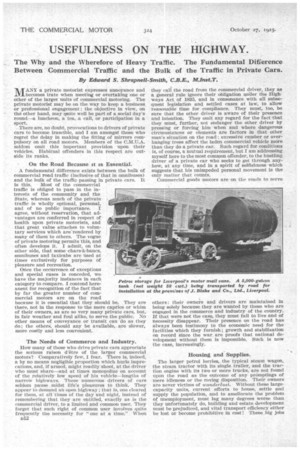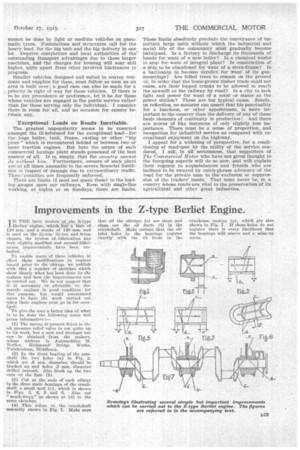• USEFULNESS ON THE HIGHWAY.
Page 10

Page 11

If you've noticed an error in this article please click here to report it so we can fix it.
The Why and the Wherefore of Heavy Traffic. The Fundamental Difference Between Commercial Traffic and the Bulk of the Traffic in Private Cars.
By Edward S. Shrapnell-Smith, C.B.E., M.Inst.T.
MANY a private motorist expresses annoyance and becomes irate when meeting or overtaking one or other of the larger units of commercial motoring. The private motorist may be on the way to keep a business or professional engagement ; the objective in view, on the other hand, may quite well be part of a social day's round—a luncheon, a tea, _a call, or participation in a sport.
There are, no doubt, provocations to drivers of private cars to become irascible, and I am amongst those who regret the delay in making the fitting of mirrors compulsory on all road motors. Members of the C.M.U.A. seldom omit this important provision upon their vehicles. Habitual offenders in this respect are outside its ranks.
On the Road Because it is Essential.
A fundamental difference exists between the bulk of commercial road traffic (inclusive of that in omnibuses) and the bulk of the traffic passing in private cars. It is this. Most of the commercial
traffic is obliged to pass in the interests of the community and the State, whereas much of the private traffic is wholly optional, personal, and of no public importance. I agree, without reservation, that advantages are conferred in respect of health upon private motorists, and that great value attaches to voluntary services which are'rendered by many of them to others. The vogue of private motoring permits this, and often develops it. I admit, on the other side, that some-chars-ti-bancs, omnibuses and taxicabs are used at times exclusively for purposes of pleasure and recreation.
Once the occurrence of exceptions and special cases is conceded, we have the majority instances in each category to compare. I contend hereanent for recognition of the fact that by far the greater number of commercial motors are on the road because it is essential that they should be. They are there, not in the response to the mere caprice or whim of their owners, as are so very many private cars, but, in fair weather and foul alike, to serve the public. No other means of conveyance or transit can do as they do; the others, should any be available, are slower, more costly and less convenient.
The Needs of Commerce and Industry.
How many of those who drive private cars appreciate the serious raison d'être of the larger commercial motors?: Comparatively few, I fear. There is, indeed, a by no means negligible proportion which hurls imprecations, and, if armed, might readily shoot, at the driver who must share—and at times monopolize on account of the relatively low speed of his vehicle—lengths of narrow highways. These numerous drivers of cars seldom pause midst life's pleasures tO think. They, appear to demand an open highway ; that is, one cleared for them, at all -times of the day and night, instead of remembering that they are entitled, exactly as is the commercial driver, to a limited and common user. They forget that such right of common user involves quite frequently the necessity for "one at a time." When
D12 they call the road from the commercial driver, they as a general rule ignore their obligation under the Highways Act of 1835, and in consonance with all subsequent legislation and settled cases at law, to allow reasonable time for compliance. They must, too, be sure that the other driver is aware of their presence and intention. They omit any regard for the fact that they must, further, not endanger the other driver by pressing or forcing him when and where dangerous circumstances or elements are factors in that other man's situation on the road : excessive camber or overhanging trees affect the laden commercial vehicle more than they do a private car. Such regard for conditions is, of course, a mutual requirement, but I am addressing myself here to the most common offender, to the hustling driver of a private car who seeks to get through anyhow, at any time, and in a spirit of selfishness which suggests that his unimpeded personal movement is the only matter that counts.
Commercial goods motors are on the roads to serve
others: their owners and drivers are maintained in being solely because they are wanted by those who are engaged in the commerce and industry of the country. If that were not the case, they must fail to live and of necessity disappear. Their presence on the road has always been testimony to the economic need for the facilities which they furnish; growth and stabilization on record since the war, are proofs that national development without them is impossible. Such is now the case, increasingly.
Housing and Supplies.
The larger petrol lorries, the typical steam wagon, the steam tractor with its single trailer, and the traction engine with its two or more trucks, are not found upon the road as the outcome of any promptings of mere idleness or the roving disposition. Their owners are never victims of wanderlust. Without these largecapacity units, current efforts to house, settle and supply the population, and to ameliorate the problem of unemployment, must lag many degrees worse than they unfortunately do, building and estate development must be prejudiced, and vital transport efficiency either be lost or become prohibitive in cost! These big jobs
cannot be done by light or medium vehicles on pneumatic tyres. Foundations and structures call for the heavy load, for the big unit and the big delivery in one Iot. Deprive contractors and local authorities of the outstanding transport advantages due to these larger machines, and the charges for housing Will soar still higher, quite apart from other involved hindrances to progress.
Smaller vehicles, designed and suited to convey residents and supplies for them, must follow as soon as an area is built over ; a good ease can also be made for a priority in right of way for these vehicles. If there is to be any precedence or preference, let it be for those whose vehicles are engaged in the public service rather than for those serving only the individual. I consider there is room for all, and no occasion for enmity' beti,veen any.
Exceptional Loads on Roads Inevitable.
The greatest unpopularity seems to be reserved amongst the ill-informed for the exceptional load—for the huge holler, tank, frame, casting or other "big piece" which is encountered behind or between two or more traction engines. But here the owner of such commercial haulage plant stands possessed of the best answer of all. It is, simply, that the country cannot do -without him. Furthermore, owners of such plant are at all times amenable to the severe financial liabilities in respect of damage due to extraordinary traffic. These penalties are frequently enforced.
There are limits (I need not quote them) to the loading gauges upon our railways. Even with single-line working, at nights or on Sundays, there are limits.
' These limits absolutely preclude the conveyance of important large units without which the industrial and social life of the coMmunity must gradually become paralysed. Is a factory to discharge its thousands of hands for want of a new boiler? Is a chemical works to stop for. want of integral plant? Is construction of -a ship to be abandoned for want of a stern-frame? Is a battleship to become derelict for want of its ,g-unmountings? Are felled trees to remain on the ground or, in order that the home-grown timber trade shall not cease, are their lopped trunks to be allowed to reach the sawmill or the railway by road? Is a city to lack light and power for want of a rotor or stator at the power station? These are but typical cases. Surely, on reflection, no motorist can assert that his punctuality for a luncheon, or other appointment, is more important to the country than the delivery of any of these basic elements of continuity in production ! And there are scores of like instances of only slightly less importance. There must be a sense of proportion, and recognition for industrial service as compared with recreational enjoyment on the highway.
I appeal for a widening of perspective, for a conditioning of road-nser by the utility of the service rendered. I ask, in all seriousness, that supporters of The Commercial Motor who have not given thought to the foregoing aspects will do so now, and will explain their cogency to acquaintances and friends who are inclined to be swayed by catch-phrase advocacy of the road for the private man to the exclusion at suppression of the traders' needs. That must never be, in a country whose roads are vital to the preservation of its agricultural and other great industries.




























































